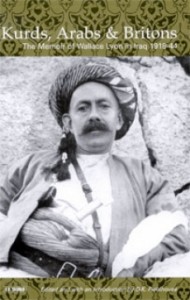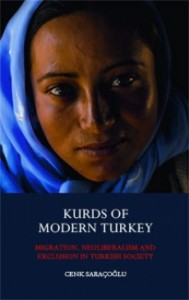A Modern History of the Kurds
Some interesting books from Tauris publishing house
Kurds of Modern Turkey
Cenk Saraço?lu
It was not until the convoy of the Democratic Society Party, the major Kurdish nationalist party in Turkey, was stoned in ?zmir in November 2009 that the increasing anti-Kurdish sentiments in Turkey were openly discussed in Turkish media and academia. This incident happened when the ruling AKP party (Justice and Development Party) was in the process of initiating a reform package that intended to expand the political and cultural rights of Kurds. This intention of the government, also known as the ‘Kurdish initiative’, sparked deep political controversies in Turkey, as both the opposition parties and large sections of Turkish society took a dim view of it. In this context, the incident in ?zmir was typically interpreted as proof of the fact that the AKP government’s reform package was leading to the development and popularisation of hitherto absent (or marginal) anti-Kurdish sentiments…
Unwitting Zionists : The Jewish Community of Zakho in Iraqi Kurdistan
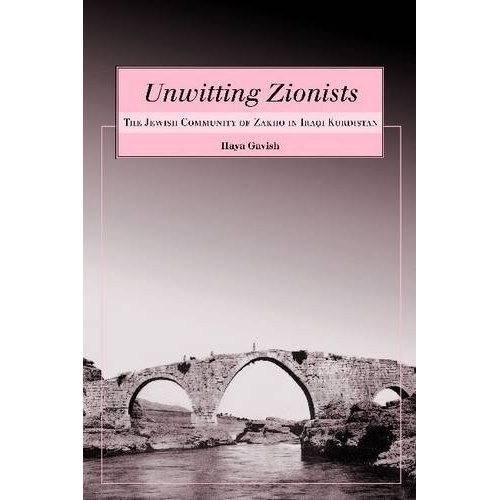
- Hardcover: 439 pages
- Publisher: Wayne State University Press (December 15, 2009)
- Language: English
- ISBN-10: 0814333664
- ISBN-13: 978-0814333662
- Product Dimensions: 9.3 x 6.2 x 1.3 inches
Unwitting Zionists examines the Jewish community in the northern Kurdistan town of Zakho from the end of the Ottoman period until the disappearance of the community through alihyah by 1951. Because of its remote location, Zakho was far removed of the influence of the Jewish religious leadership in Iraq and preserved many of its religious traditions independently, becoming known as “Jerusalem of Kurdistan”, the most important Jewish community in the region. Author Haya Gavish argues that when the community was exposed to Zionism, it began to open up to external influences and activity. Originally published in Hebrew, Unwitting Zionists uses personnal memoirs, historical records, and interviews to investigate the duality between Jewish traditions and Zionism among Zakho’s Jews.Gavish consults a variety of sources to examine the changes undergone by the Jewish community as a result of its religious affiliation with Eretz-Israel, its exposure to Zionist efforts, and its eventual immigration to Israël. Because relatively little written documentation about Zakho exists, Gavish relies heavily on folkloristic sources like personnal recollections ans traditionnal stories, including extensive material from her own fieldwork with an economically and demographically diverse group of men and women from Zakho. She analyzes this firsthand information within a historical framework to reconstruct a communal reality and lifestyle that was virtually unknown to anyone outside of the community. Gavish also addresses the relative merits of personnal memoirs, optimal interviewer-interviewees’ memories in her study. Biographical details of the interviewees are included for additionnal background. Folklore, oral history, anthropology, and Israeli studies scholars, as well as anyone wanting to learn more about religion, community, and nationality in the Middle-East will appreciate Unwitting Zionists.Haya Gavish is lecturer in Hebrew language and literature at the Hebrew Union College-Jewish Institute of Religion, Jerusalem.
Toward the end of 1948, the family of Abraham Zaqen hired Jewish raftsmen from Zakho to transport sawed trees down to the river and floated them to Mosul, where they were to be sold. A heavy snowstorm delayed them up for a few days in one of the villages, and only on the sabbath the sun finally break through the clouds. They dearly wanted to warm themselves, but due to the Sabbath refrained from lighting a fire. And so, they began dancing, in traditionnal Kurdish fashion : the lead dancer sang “tee, tee, tee”, waving a kerchief in his free hand, and all the others replied, “Israel”, referrinf to the Jews, the People of Israel. That was the tradition among Zakho Jews. Some Kurds also gathered round the enthusiastic dancers, but one of them – a policeman, a soldier, or a drunk – complained to the authorities, accusing the Jews of “Zionism”. The dancers were arrested, brought to Zakho and from there to Mosul, where four of the oldest among them were freed. The other eleven were taken to Baghdad for trial in a military court and sentenced to imprisonment. From that day on, the Jews of Zakho had their own “Prisonners of Zion” (Heb. assirei tziyyon, persons who were persecuted because of their Zionist activity or aspiration).I heard many versions of this story from former Zakho Jews, four of whom were among those inprisoned. Although there was a consensus among all my interviewees about the event itself, for many years they disagreed regarding details and interpretation. Did the raftsmen dance innocently to warm themselves or were they expressing their joy at the establishment of the State of Israël ? Did the lead dancer wave a simple kerchief or was it intended the Israeli flag ? Was “tee, tee, tee, Israel” merely a traditionnal phrase, sung when dancing at weddings and other celebrations, referring to the People of Israël throughout its lengthy history ? This episode was a traumatic event for the Jews of Zakho. When their community came to an end in 1951, with the mass immigration to Israel, the prisonners remained behind, in jail. They were released only later and came to Israel with the last migrants from Iraq.This episode is indicative of the duality between Jewish tradition and Zionism among the Jews of Zakho. Such duality in Jewish communities tje world over, including those in Islamic countries, has been the subject of much research. It is not my intention to define Zionism, but rather to delineate the Zionist consciousness of Jews in this community, as understood and put forward by those whom I interviewed. Though the community of Zakho, a town in northern Iraqi Kurdistan, was geographically remote and far removed from the influence of the Jewish religious leaderhsip in Iraq, it unswervingly preserved its traditionnal – that is, religious – character. It generally wrestled with its problems by itself and, as the most important community in the region, was sometimes known as the “Jerusalem of Kurdistan” (…).
Yezidism in Europe: Different Generations Speak about their Religion
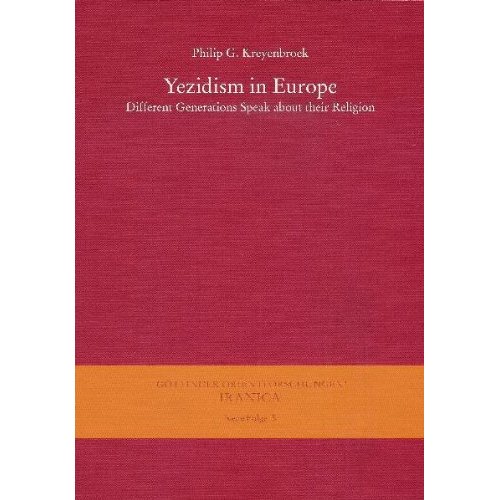 Taschenbuch: 245 Seiten
Taschenbuch: 245 Seiten- Verlag: Harrassowitz, O; Auflage: 1., Aufl. (September 2009)
- Sprache: Englisch
- ISBN-10: 3447060603
- ISBN-13: 978-3447060608
“Yezidism is a minority religion that is largely based on tradition rather than scripture. In the homelands – Turkey, Iraq, Syria and Transcaucasia – its world-view is closely connected with local culture, and most easily understood in that context. From the 1960s onwards, an increasing number of Yezidis from Turkey, Iraq and Syria were forced to migrate to Western Europe. After the fall of the Soviet Union many Yezidis from Armenia and Georgia moved to Russia and the Ukraine. This work addresses the question of differences in perception of the religion between Yezidi migrants who grew up in the homeland and those who were mainly socialised in the Diaspora. It is based on extensive qualitative research among Yezidis of different generations in Germany and Russia.”
Rebal Land : Among Turkey’s forgotten people
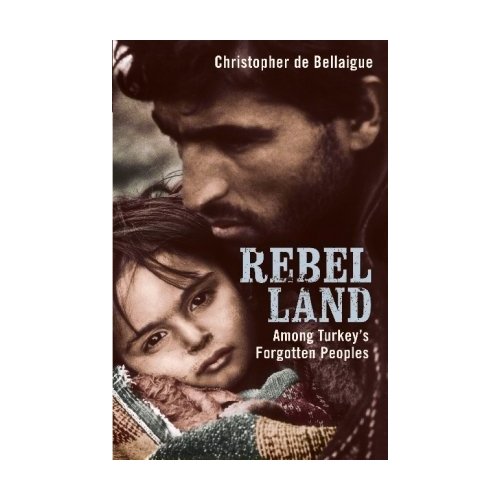
- Relié: 288 pages
- Editeur : Bloomsbury Publishing PLC (6 avril 2009)
- Langue : Anglais
- ISBN-10: 0747586284
- ISBN-13: 978-0747586289
The Age of orphans
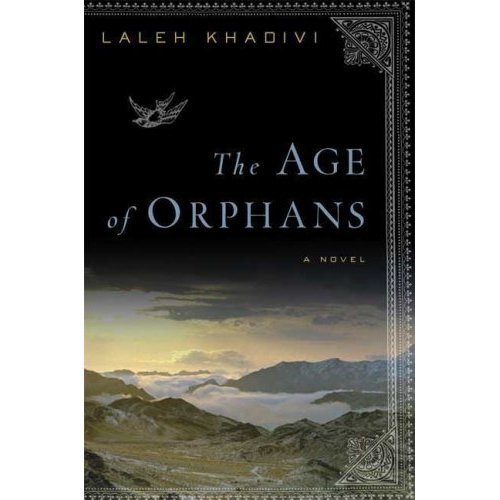
- Order it on Amazon : The Age of Orphans: A Novel
- Hardcover: 304 pages
- Publisher: Bloomsbury USA (March 3, 2009)
- Language: English
- ISBN-10: 1596916168
- ISBN-13: 978-1596916166
- Product Dimensions: 8.3 x 5.8 x 1.2 inches
From Publishers Weekly
Starred Review. Ironic, beautifully written, brutal and ugly, Khadivi’s ambitious debut novel follows a Kurdish boy who is tragically and violently conscripted into the shah’s army after his own people are slaughtered in battle. Assigned the name Reza Pejman Khourdi—Reza after the first shah of Iran, Pejman meaning heartbroken and Khourdi to denote he’s an ethnic Kurd—the boy suppresses all things Kurdish within him, fueled by a sense of self-preservation and self-loathing. Channeling fear and hate into brutal acts against the Kurds, Reza makes a quick climb up the military career ladder, eventually gaining an appointment to Kermanshah, a Kurdish region in the north of Iran. There, as overseer of his own people, Reza promotes Kurdish assimilation and the budding nation of Iran while mercilessly silencing voices of Kurdish independence. As he grows old with his Iranian wife, Meena, Reza’s internal conflicts simmer, then boil over, with unexpected and terrible results. This difficult but powerful novel, the first of a trilogy, introduces a writer with a strong, unflinching voice and a penetrating vision. (Mar.)
Copyright © Reed Business Information, a division of Reed Elsevier Inc. All rights reserved.
Review
‘This is a stunning debut unflinching, gorgeously poetic, intimate yet with a wondrous sweep of history. To read the tale of Reza Khourdi is to take a journey deep inside the darkest cavity of the heart’ CRISTINA GARCIA, author of National Book Award finalist Dreaming in Cuban ‘Laleh Khadivi is genuinely gifted and ruthless with that gift. We are all so fortunate that she is, for it takes both talent and ruthlessness to delve this deeply into an epic life’ DOROTHY ALLISON, author of National Book Award finalist Bastard Out of Carolina ‘The Age of Orphans is an arresting, powerful, transformative, unflinching, epic and deeply affecting novel. I cannot recommend it enough. A major voice to watch’ Chris Abani, author of Graceland and The Virgin of Flames ‘Khadivi’s writing is luminous in this tragic story of an “orphan of the earth,” which is rendered in prose that is by turns graphic and poetic’ Deborah Donovan, Booklist –
21st Annual Conference of the Kurdish National Congress of North America
The 21st Annual Conference of the Kurdish National Congress of North America (KNC) will be held March 2009 in the Washington DC area.
“Future of Kurdistan: Thinking Like a Nationâ€
March 27-28, 2009
Crowne Plaza Rockville
3 Research Court, Rockville, MD 20850 (Washington DC area)
Tel 301.840.0200
Conference Schedule:
Friday March 27 – Conference Sessions: Noon to 6:00 pm
Saturday March 28 – Conference Sessions: 9:00am to 5:00 pm
Saturday March 28 – Newroz Banquet and Celebration: 7:30pm to 1:00 am
The Conference and Banquet are open to the public and all are welcome to participate. There is no charge for the Conference Sessions;Â there will be an admission fee for the Newroz Banquet on Saturday.
Travel:
Airport: Nearest is Washington Reagan (DCA)
Alternates: Dulles Int’l (IAD) or Baltimore Washington (BWI)
Hotel: Reduced room rates available if made before Feb 25, 2009
Telephone 800-227-6963 and mention Kurdish National Congress
Best Regards,
Tom Ver Ploeg
Secretary – KNC of NA
Ministry of Higher Education provides scholarship for students
The University of Salahaddin is accepting applications from students in Kurdistan region for studies in Germany, Poland, and Russia in Master’s and Doctorate degrees. The scholarships are provided by the Iraq’s minister of Higher Education and Scientific Studies.
But officials at the Salahaddin University say that they have not received a warm welcome by the students although the deadline for applications is approaching fast.
There are 20 scholarships that are going to be awarded for studies in scientific fields in Russia. Six scholarships will be awarded to students who want to study in Poland in Law, Mathematics, Information Technology, Geography, History and Administrations and Economy. There are a few scholarships that will be awarded to students who want to study in Germany.
Sherzad Mohammed, head of the Academic Relations office at the University of Salahaddin, told Rudaw that so far his office has not received many applications.
There are a number of qualifications that students should have in order to apply for scholarships. For example applicants for Doctorate degree must have obtained an average of 75 out of 100 in every subject he has taken in graduate studies. Applicants for Master’s degree must have obtained 70 out of 100.
The age of applicants must be under 35 and the deadline is February 28.
Please contact the University of Salahaddin for more information:
University of Salahaddin
Karkuk Street
Runaki 235 n323,
Erbil,Kurdistan Region
Iraq
Tel : +964 66 2230409
+964 66 2224122
+964 66 2262006
source rudaw.net)/
Kurmanji Should Live – Petition
http://www.petitiononline.com/kurmanji/petition.html
To: Kurdistan Regional Government
Dear Mr. Prime Minister Nechirvan Barzani,
As a Kurd, I am so honored to see the promising developments in the southern part of our homeland and also to see you as the Prime Minister of a unified Kurdish government. I have no doubt that you will serve our nation in the best possible way.
As the Kurds of the North (of Kurdistan) who are victims of cruel denial and suppression policies of the Turkish state and deprived of basic human rights, we turn our hope to southern Kurdistan and expect you to take some steps for 25 million Kurds in the biggest part of Kurdistan.
As you well know, we still can not speak Kurdish freely or get education in our mother tongue. Our language can not have any channels to survive and flourish. Due to this, the situation of the Kurdish language is getting worse by the day and speakers of our beloved language are decreasing gradually. Even in the capital city, Amed, the daily social, cultural and political life is in Turkish.
Needless to say, PKK is just as guilty as the Turkish state for not paying enough attention to the Kurdish language and culture and not prioritizing it. As Dr. Ismail Besikci states in one of his recent interviews, PKK uses the words Kurd and Kurdistan quite often, yet it has always used Turkish in its publications. There is also a significant amount of Turkish on Roj TV despite the worsening language issue; TV officials don’t seem to take any precautions on this matter.
While this is the gloomy picture of the North, we are enthusiastically looking forward to seeing good news from you about the world’s most oppressed language, the Kurmanji Kurdish dialect. It is a Kurdish dialect spoken by more than 25 million Kurds and subjected to countless repression; it wasn’t ever allowed to live freely, to be the language of academia, or be studied in universities except in the tiny Kurdish community in Armenia. Its speakers have always been tortured, beaten and killed; singers and writers were always persecuted. As a result of such brutal policies, millions of Kurds are not able to speak their mother tongue and the numbers of Kurmanji speakers seem to be dying day by day.
Your Excellency,
As the Prime Minister of Kurdish Regional Government, we expect your government to take immediate measures to protect Kurmanji from disappearing all together. In my opinion, a Kurmanji conference should be organized, for instance in Duhok, as soon as possible with the participation of Kurmanj linguists, academicians, and writers to determine the strategies needed to keep Kurmanji alive and ways to flourish it.
In addition, some funds should be arranged in order to publish Kurmanji books, newspapers, magazines and learning materials such as CDs and computer programmes.
Such suggestions can be increased but must be prioritized in accordance with most urgent ones. While, as I mentioned before, we are expecting excitedly, for you to make the misfortunate situation of our beloved Kurmanji better, we are shocked by the recent news coming from the south. Kurmanji, which you call Behdini over in the south, has no value and status. Although the amount of Kurmanji speakers in the South is not much less than the Sorani speakers, it is very disappointing that the Iraqi Kurdish leaders and politicians treat it like a step-son.
According to Permanent Committee on Geographical Names (http://www.pcgn.org.uk/The%20Kurdish%20 … 20Iraq.pdf) the amount of Sorani speakers is 2.8 million (10.6% of Iraqi population) whereas the amount of Kurmanji speakers is 2.2 millions (8.4 of Iraqi population). Despite the fact that there is little difference in the figures of the statistics, it is very saddening to see Kurmanji be put in this position.
Furthermore, it is no doubt that Kurmanji is the widely spoken dialect of the Kurdish language spoken by 75% of all Kurds. It is also the only dialect spoken in all four parts of Kurdistan, while Sorani is only spoken in two parts; some parts of Iraqi Kurdistan and Iranian Kurdistan.
If Kurdistan is one and Kurdish people are brothers, then there should be more respect and value for Kurmanji, and thus Kurmanji speakers. It is obvious that Kurdish people can not have a common language by ignoring Kurmanji or trying to lower its value. For this reason it is a shame to recently come across what we have been hearing and seeing all that is being discoursed in the news and the media.
First of all, there is an obvious intention to remove Kurmanji/Behdini, where this removal includes the removal of Kurmanji even from classes in the Behdinan region and make all classes Sorani. Secondly, we have read with great enthusiasm that, on behalf of the Kurdistan Regional Government, you signed an agreement with Microsoft as a participant of a world wide Windowsa Kurdi (Kurdish Windows) initiative. I, along with a number of other Kurds, felt honored and pleased to see such a development. Yet, like millions of Kurmanji speaking Kurds, it devastated me to hear that this Microsoft Windows will only be in Sorani with Arabic letters which means we, the Kurds of Turkey, will not be able to utilize such a product. I hope what has been reflected in the media is not true and that your government has made a deal with Microsoft for a Kurmanji Windows as well.
We have to understand the situation at hand was the doing of our enemies and those whose wish is to divide Kurds. To further the work of such enemies, that is by banning and removing Kurmanji, we are not progressing in any way but rather retreat the accomplishments we have made over the years. To make official such a decision will further deteriorate the unity the Kurds have experienced. Such an action is being done at the expense of the majority, where democracy fails to work and absolutism seems to prevail.
His Excellency,
I am a proud Kurd and I love anything related to Kurds and Kurdistan. Although I am a Kurmanji Kurd, I also learned some Sorani not because it is superior or special, but because it is a part of my language. I love all Kurdish dialects and spend a great number of hours trying to learn more about them. Yet, our beloved Kurmanji, which was passed down to us by Ehmede Xani, Melaye Ciziri, Feqiye Teyran, Ehmede Beyazidi, Cegerxwin and beautiful voices of Mihemed Arife Ciziri, Hesen Ciziri, Eyshe Shan, Meryemxan, Mihemed Shexo, Karapete Xacho, Sheroye Biro, Kawis Axa and many others seems to come to a downfall for reasons we can overcome.
It is our nationalistic and patriotic duty to preserve and promote it and pass it to future generations. At this point, the biggest responsibility falls onto Your Excellency’s shoulders and the hard working Kurdish politicians like yourself since you are the Prime Minister of the only free part of the homeland and along with your colleagues are the hope for all Kurds in South Kurdistan.
I wholeheartedly hope and believe that your government will take necessary measures to preserve and develop Kurmanji and that Kurmanji Microsoft Windows will be the first step in this direction.
Sincerely,
The Undersigned
NAMEYEK VEKÎRÎ JI HIKÛMETA HEREMÎ YA KURDISTANÊ RE
Birêz Serokwezîr Neçîrvan Barzanî,
Wekî Kurdên welatparez dîtina pêşveçûnên başûrê welatê me û bûyîna we ya serokwezîrê Hikumeta Yekbûyî, me pir serbilind dike. Em ji dil bawerîya we dikin ku hunê vî karî bi serfirazî bicîh bînin û xîzmeta netewa xwe bikin.
Wekî Kurdên bakûr ku bi sedan sal in bûne mexdûrên sîyaseta zilm û zordarîya dewleta tirk û ji ziman û nasnameya xwe bêpar mane, me berê xwe daye başûrê welata xwe ku hun jî jibo 25 mîlyon Kurdên, li mezintirêîn perçeya Kurdistanê hinek pengavan pêşçav bavejin.
Wekî hun baş dizanin, em hîn jî nikanin bi azadî Kurdî bipeyvin û bi zimanê xwe dayikê perwerdê bibînin. Ti derfet tune ne ku zimanê me bijî, biveje û pêşkeve. Seba vê yekê, rewşa zimanê Kurdî herku dihere xirabtir dibe û qisekerên zimanê me ya delal roj bi roj hindiktir dibin. Heyf e ku li paytaxta Kurdistana mezin, li Amedê jî zimanê rojane ya civakî, kulturî û siyasî bûye tirkî û ev yek eşekî mezin dide dilê me.
Ne hewce ye meriv bîne zimên ku, li ser vê rewşa xirab, PKK jî bi qasî dewleta tirk berpisîyar e jiber ku girîngî û qinyat neda ziman û kultura Kurdî. Wek, mamoste Îsmaîl Beşîkçî jî, di yek ji hevpeyvînên dawî anîbû zimên her çi qas PKK gelek caran qala Kurd û Kurdistanê dike jî, di hemî weşanên xwe de tirkî bikar tîne. Her çend wekî me gava dinî jî gotî, rewşa zimanê me xirantir bibe jî, di Roj TV,de nîsbeta tirkî pir zede ye û birêvebirên televizyonê ne di vê xem û fikara de ne.
Gava ev be, rewşa me ya reşbîn, em bi heyecanekî mezin li we dinerin ku, li derheqa Kurmancî ku, li dinê zimanê herî bindest e û zordarî û tadayîyên pir giran dîtîye, dengûbasên xweşik û pengavên xurt bibînin. Kurmancî ku zimanê ji 30 milyonan pirtir Kurdan e, rastî gelek zehmetî û dijwarîyên bêdawî bûye û ti car derfet nehatîye dayîn k ubi serbestî jîyan bike, bibe zimanê zanistî ye û di zanîngehan de were xebitandin. Qisekerên wê, her dem hatine eşkence kirin, lêxistin û kuştin: hunermend, nivîskar û rewşenbîrên wê tim hatine ceza kirin û eşkence û zindan ketiye para wan. Wekî encama wan sîyasetên înkar û faşîstî, bi mîlyonan Kurd nikanin bi zimanê xwe yên dayike bipeyîvin û hejmarê Kurmancîexifan roj bi roj kêmtir dibe.
Rêzdar Serokwezîr,
Wekî Serokwezîrê Hikûmeta Heremî ya Kurdistanê, em ji we hêvî dikin ku, jibo parastina Kurmancî, demekî zutir hinek tedbîrên bistînin ku zimanê me yê şerîn, bi temamî ji holê ranebe û nemire. Bi dîtina me, divê bi tevlîbûna linguîst, rewşenbîr, nivîskar û lêkolînerên Kurmanc, li Duhokê konferansek were lidar xistin da ku seba parastin û vejandina Kurmancî biryar bete dayîn û rê û rêbaz werin dest nîşan kirin.
Her wiha, divê, hinek derfetên aborî werin peyda kirin ku pirtûk, rojname û govarên Kurmancî werin çap kirin û berhemên hînkirina Kurmancî mîna CD û programên kompîterî werin amade kirin.
Meriv dikane pêşnîyarên vî rengî zedetir bike lê em dixwazin nameya xwe dirêj bikin. Gava, daxwazî û hêvîyên me ji hikûmeta we bi vî awayî ne, ku rewşa Kurmancî ya tar û mar bete qenc kirin û birînên wê bete derman kirin, wan dengûbasên dûmahîyê ku ji başûr tên, em dilşikestî kirin. Kurmancî ku li başûr wekî Behdînî tê binav kirin, bê qedr û qiymet e û statûya wê jî tune ye. Her çi qas nîsbeta Kurmancîaxefan, ji yên Soranîaxefan ne gelek kêmtir in, cîyê daxê ye ku rêber û sîyasetvanên başûr wekî kurê zirbavê li Kurmancî meze dikin û ti girîbgî nadine wê.
Li gorî, Komîteya Herdemî ya Navên Coxrafîk ya Birîtanî
www.pcgn.org.uk/The%20Kurdish%20Toponymy%20of%20Northern%20Iraq.pdf hejmara Soraniaxefan 2.8 mîlyon e (% 10.6 nîfûsa Îraqe) û yên Kurmancîexef jî 2.2 mîlyon in (% 8.4 nîfûsa Îraqê). Her çend, di navbera van her dû zaravayan ferqek mezin tûne be jî, cîhê daxê ye ku Kurmancî di vê rewşa pir nizm û bê qûymet da ye.
Dîsa, bê gumanê ku Kurmancî dayalekta Kurdî ye ku ji alîye % 75,a Kurdan tê axaftin. Her wiha ji nav hemî zaravayên zimanê Kurdî, bi tenê Kurmancî li her çar perçeyên Kurdistanê tê peyîvîn û wekî em dizanin Soranî tenê li hinek beşên Kurdistana Başûr û Rojhilat tê axaftin.
Heger Kurdistan yek perçe ye û em gîş birayên hev in, vê çaxê, pêdivî ye jibo Kurmancî û Kurmancîaxefan betir rêz û ihtîram hebe. Eşkere ye ku bi red kirin û tûne kirina Kurmancî, gelê Kurd nikane bibe xwedîyê zimanekî hevbeş û yekgirtî. Jiber vê yekê, şermekî giran e ku em di wan rojên dawî de rastî hinek raport û nivîsan tên ku birastî dilê meriv pir dişkenin.
Berî her tişt, nîyetaka gelek cîddî heye ku Kurmancî/Behdînyê ji seranser Kurdistana Başûr rakin û hemî dersên xwendinê bikin Sorani. Ya diduyan ev e ku, me bi dilgermî xwend ku, li ser navê Hikûmeta Heremî ya Kurdistanê, we kontraktek bi Microsotf re îmze kir, ew şîrket Windowsa Kurdî derxîne. Wekî tê zanîn, ev çend sal in, bi peşengîya Kurdên Bakûr bizavek dihat meşandin ku Microsoft, bernameya Windowsê bi zimanê Kurdî hazir bike. Lê, wekî mîlyonan Kurd, dilên me bû perçe perçe ku me xwend ew kontrakta we îmze kirîye bi tenê Soranî ye û bi tîpên erebî ye. Wateya wê jî ev e ku, em ango Kurdên Bakûr digel kurdên Rojaba nikanîbin ji vê programê sudê vergirin û vê programê bikar bînin.
Em ji dil hêvî dikin ku, van tiştên hatine gûhên me ne rast in û hikûmeta we li ser Windowsa Kurmancî jî, bi Microsoft re kontrakt îmze kirîye.
Serokwezîrê hêja,
Em Kurdên serbilind in û her tiştên giredayî Kurd û Kurdistan hez dikin. Her çend em Kurmanc bin jî, em biçek Soranî jî ferbûne lê ne ku ew dayalektek taybet û bilind e lê jiber ku perçekî zimanê me ye. Divê Soran jî hezî zimanê me bikin û qedr û qiymet bidinê wê. Bi qedexe kirina Kurmancî yan jî bi biçûk dîtina wê em nagehjin derekî. Divê rind were fehm kirin ku gava Kurdên Kurmancîaxef zimanê xwe jibîr bikin, ew dest bi axaftina tirkî, erebî yan farisî bikin lê ne soranî! Em hemî zaravayên zimanê Kurdî hez dikin û dive jibo wna gîşkan rêz were dayîn. Lê divê baş were fehm kirin ku Kurmancîya şerîn ji Ehmedê Xanî, Melaye Ciziri, Feqiye Teyran, Ehmede Beyazidi, Cegerxwin û ji dengên bedew yên Mihemed Arifê Cizirî, Hesenê Cizirî, Eyşe Şan, Meryemxan, Mihemed Şêxo, Karapetê Xaço, Şeroyê Biro, Kawîs Axa û ji yên din emanet maye û erka her Kurdek e ku vî zimanê hêja û sipehî biparezin ku ji nav pelên dîrokê hinda nebe. Ku ew zimanê delal hinda be û bimire, em dê li mirovahîyê stû xwar bin û dîrokê ti car me efû nake.
Wekî me gava dinî jî anî zimên, wazîfê me her Kurdan ev e ku Kurmancîyê biparezin û qiymeta wê bilind bikin û zarokên xwe jî ferî Kurmancîyê bikin. Di vî warî de, rolekî mezin dikeve ser milê sîyasetvanên Kurd mîna we, çimkî hûn Serokwezîrê Kurdistana Başûr in û tenê vê perçê welatê me azad e û hêvîya mîlletê kurd li ba we ye.
Em ji dil hêvî û bawer dikin ku hikûmeta we, jibo parastin, zindî kirin û pêşve birina Kurmancî, di demekî zutir de hîn xîzmetên pêşçav bike û tedbîrên pedivî bistîne û Windowsa Kurmancî jî bibe pengava yekan.
Bi silavên Kurdîtîyê
Li ser evîndarên zimanê Kurdî
Amed- Kurdistan

